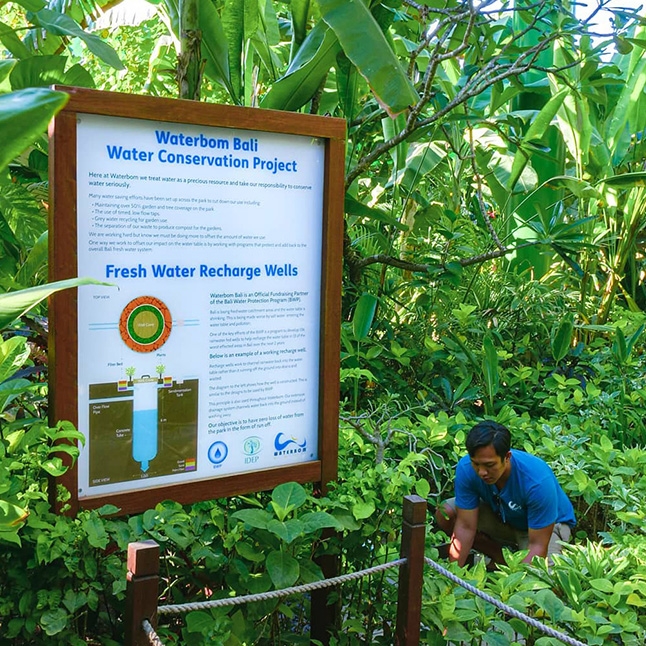Waterbom, the renowned waterpark in Kuta, Bali, has made a resolute commitment to achieving net zero emissions by 2033. This bold environmental goal demonstrates that if a waterpark can implement significant sustainability measures, any organization can do the same.
Waterbom is a favorite destination in Bali for locals and tourists, including families, friends, and solo travelers. It has been continuously updated with the latest sustainable technologies to ensure it remains a safe and enjoyable place for visitors.
Sayan Gulino, the CEO of Waterbom, has been instrumental in spearheading these upgrades. During the park’s 30th anniversary, Gulino emphasized the park’s new goal of reaching net zero by 2033. He further detailed that Waterbom’s operations would transition to 100% renewable energy sources. The waterpark also adopts strategies to remove more carbon from the atmosphere than it emits. The CEO also promised transparency in their process by sharing regular updates and data with the public.
Waterbom has made substantial progress towards its sustainability objectives. Although aiming for net zero by 2033 presents challenges, the Waterbom team is experienced in implementing significant changes swiftly. The net zero goal involves offsetting the carbon emitted by the park so that no additional greenhouse gases are released into the atmosphere.
The plan for achieving this objective has been meticulously crafted in close collaboration with leading environmental consultants. This strategic alliance ensures that Waterbom’s sustainability plan is a well-founded strategy that aligns with the Science Based Targets initiative (SBTi). Waterbom is notably the only tourism company in Indonesia recognized by SBTi. It has advanced its target year from 2023 to 2033 to push the achievable boundaries.
Waterbom also partners with environmental consulting firm Eco-Mantra. The waterpark focuses on enhancing energy efficiency, switching to electric appliances, and other emissions reduction initiatives. Maitri Fischer, CTO of Eco-Mantra, remarked, “The energy reduction and renewable strategies we’ve designed will require a significant investment and commitment over the next decade.”
Fischer praised Waterbom Bali’s commitment, highlighting it as a model of responsible corporate climate action in the tourism sector. The waterpark’s previous accomplishments, such as achieving a 95% recycling rate and significantly reducing waste sent to landfills, underscore its commitment to environmental stewardship.
The park’s dedication to sustainability is deeply rooted in the local Balinese philosophy of Tri Hita Karana. This philosophy emphasizes balance and harmony between people, nature, and the spiritual realm. Gulino, who grew up in Bali, expressed a deep sense of responsibility to protect the island’s natural environment. This motivates his push towards making Waterbom a global leader in sustainability.
The journey to net zero is challenging and costly, but it’s seen as achievable with hard work and continuous evaluation of progress. Each year, Waterbom plans to assess its sustainability strategies to ensure it meets its ambitious target.

Sustainable Development Across Bali’s Real Estate Sector
The commitment to sustainability evident at Waterbom is part of a broader trend across Bali. In recent years, developers and homeowners have been increasingly focused on incorporating eco-friendly practices and sustainable design into their projects.
This shift is particularly noticeable in the vibrant area of Canggu, known for its scenic rice paddies and surf-friendly beaches. Many Canggu villas for rent now boast features like solar panels, water recycling systems, and construction materials sourced from sustainable or recycled sources. These initiatives not only appeal to environmentally conscious renters and tourists but also contribute to the overall reduction of the carbon footprint of Bali’s real estate offerings.
Bali property developers also embrace green building standards and certifications. They recognize that sustainable development is no longer just a niche market but a significant aspect of the mainstream real estate industry. These developments are increasingly marketed not only for their luxury and comfort but also for their environmental sustainability. They attract buyers and investors keen to support eco-friendly initiatives.
The Canggu rental property market, in particular, illustrates how sustainability can be integrated seamlessly into the luxury tourism sector. Properties are being designed with green spaces that preserve the area’s natural beauty while incorporating modern, energy-efficient technologies that minimize environmental impact.
This trend is spreading across Bali, from Ubud’s tranquil retreats to Seminyak’s bustling tourist hubs. Now, more real estate developers realize the long-term benefits of sustainable building. This holistic approach to sustainability helps preserve Bali’s unique environment and cultural heritage. It also ensures that the island remains a paradise for today’s visitors and future generations.